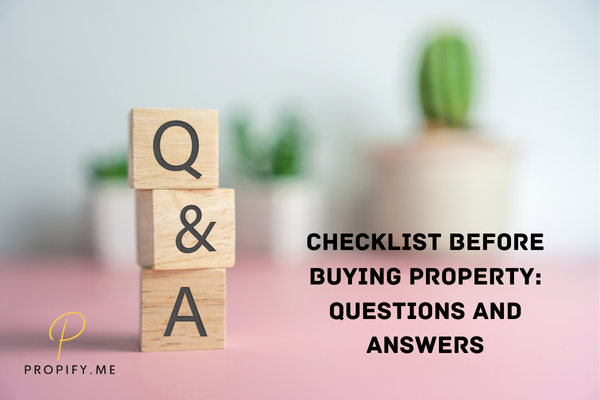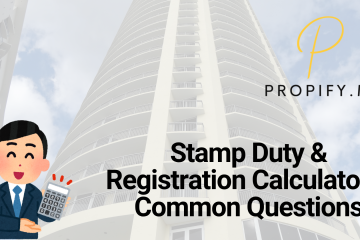
Checklist Before Buying Property: Questions and Answers
When purchasing a property, due diligence is critical to ensure that your investment is safe and legal. Here are the essential documents and approvals you must check before making a property purchase, explained in a question-and-answer format for better understanding.
1. What is a Plan Pass Copy, and why is it important?
A Plan Pass Copy is an approved building plan issued by the local municipal authority or urban development body. It ensures the construction adheres to zoning laws, safety regulations, and building codes.
What to check?
- Verify the building layout matches the approved plan.
- Ensure the builder has not made unauthorized changes.
Why is it crucial?
Purchasing a property without a valid plan pass copy could lead to legal issues or demolition if the construction violates local regulations.
2. What is a Commencement Certificate?
A Commencement Certificate (CC) is a document issued by the municipal authority, certifying that the builder has received permission to begin construction after submitting and getting the building plan approved.
What to check?
- Confirm the CC covers the project’s initial and subsequent phases.
- Ensure the builder’s construction activities are legal.
Why is it important?
Without a CC, construction may be illegal, and you could face issues with ownership and loan disbursement.
3. What is Environmental Clearance (EC), and when is it needed?
An Environmental Clearance (EC) is required for large construction projects to ensure compliance with environmental regulations.
What to check?
- Confirm if the project has EC if the area exceeds the threshold specified by law.
- Look for clearance details like water management, green cover, and waste disposal plans.
Why is it significant?
Projects without EC could face legal challenges or stoppages, potentially delaying possession.
4. How to verify project information on the RERA website?
The Real Estate Regulatory Authority (RERA) provides a comprehensive database of registered real estate projects.
What to check?
- Look for project registration status, approvals, builder credentials, and complaint history.
- Verify project timelines and penalties for delays as mentioned on the RERA website.
Why is RERA important?
RERA protects buyers from fraud by enforcing transparency and accountability among builders.
5. What is an Allotment Letter?
An Allotment Letter is a document provided by the builder to confirm the allocation of a property to the buyer.
What to check?
- Ensure it includes payment details, project timelines, and terms of possession.
- Use it to secure a home loan from financial institutions.
Why is it needed?
The allotment letter acts as proof of purchase and serves as the foundation for further transactions, including loans.
6. What is a Possession Letter?
A Possession Letter is issued by the builder, stating the completion of construction and the buyer’s right to take possession of the property.
What to check?
- Confirm the date of possession mentioned aligns with your agreement.
- Ensure all dues are cleared before possession.
Why is it important?
A possession letter is necessary to claim ownership and complete the registration process.
7. What is an Occupancy Certificate (OC), and how is it different from a Possession Letter?
An Occupancy Certificate (OC) is issued by the local municipal authority, certifying that the building complies with approved plans and is fit for occupation.
What to check?
- Ensure the builder has obtained an OC before you move in.
Why is it crucial?
Possession without an OC could lead to legal troubles, penalties, or even eviction.
8. What is a Title Clear Certificate or Release Certificate?
A Title Clear Certificate ensures that the property’s title is free from legal encumbrances.
What to check?
- Verify that there are no outstanding loans, claims, or disputes on the property.
- Obtain a legal opinion from a property lawyer.
Why is it needed?
To ensure your ownership rights are secure and uncontested.
9. What is a Property Card (7/12 extract), and why is it necessary?
A Property Card or 7/12 extract is a government document providing ownership details and historical information about the property.
What to check?
- Verify ownership details match the seller’s claims.
- Check for pending taxes or disputes.
Why is it important?
It ensures clarity on ownership and prevents fraudulent transactions.
10. What is Dastaveg or Property Registration?
Dastaveg refers to the property’s registration document that legally transfers ownership to the buyer.
What to check?
- Verify that the deed is registered at the sub-registrar’s office.
- Ensure all parties sign the agreement in the presence of witnesses.
Why is it critical?
Without registration, you do not legally own the property.
11. What is a Property Tax Receipt, and why should you check it?
A Property Tax Receipt shows that the previous owner has paid all taxes due on the property.
What to check?
- Verify the latest tax receipt and confirm there are no outstanding dues.
Why is it essential?
Unpaid property taxes could lead to penalties or even property disputes.
12. What is a Share Certificate, and when is it required?
A Share Certificate is issued by a housing society to certify your membership and ownership in a cooperative housing society.
What to check?
- Verify your name is correctly entered on the certificate.
Why is it important?
It serves as proof of ownership and membership in the society.
13. What is an NOC from the Society, and why do you need it?
A No Objection Certificate (NOC) from the housing society confirms that the society has no objections to the sale or transfer of the property.
What to check?
- Ensure the NOC is signed by authorized society members.
Why is it needed?
Some financial institutions require an NOC before approving loans, and it prevents future disputes.
Additional Tips
- Hire a property lawyer: Ensure all documents are verified and genuine.
- Check for loans or mortgages: Verify that the property is not under any existing loan or mortgage.
- Physical inspection: Visit the property to ensure it aligns with documents.
- Builder’s reputation: Check reviews and past projects.
- Home loan pre-approval: Secure loan eligibility to streamline the purchase.







